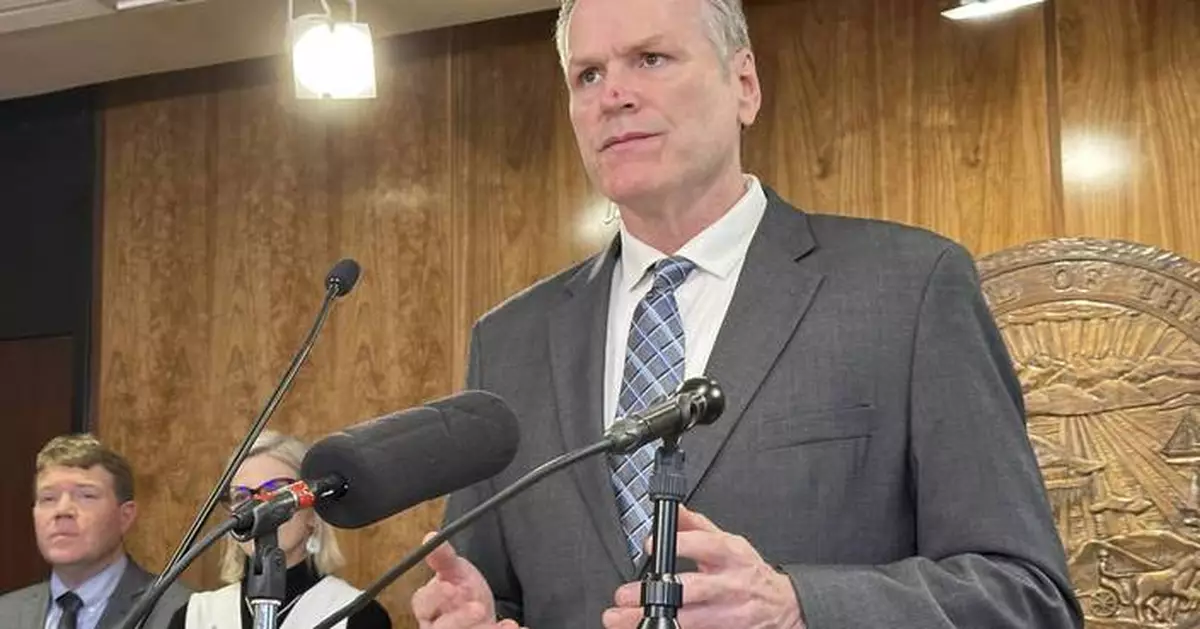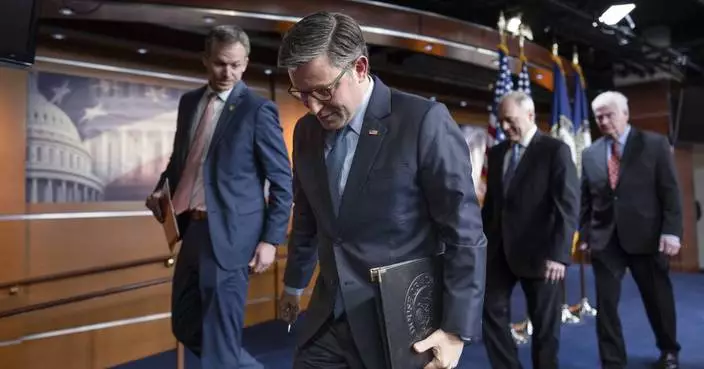JUNEAU, Alaska (AP) — Alaska Gov. Mike Dunleavy’s wish list for the incoming Trump administration includes oil and gas exploration in the pristine Arctic National Wildlife Refuge and reversing restrictions on logging and road-building in a temperate rainforest that provides habitat for wolves, bears and salmon.
Dunleavy has asked President-elect Donald Trump to issue a state-specific executive order that would set in motion “critical agency actions that would restore opportunity to Alaska" in line with Trump's first administration. Dunleavy and other Republican political leaders in the state have expressed excitement about Trump's return to the White House and believe he will be more friendly to oil and gas, mineral and other resource development than President Joe Biden.
Alaska has a long history of fighting what it sees as federal overreach, particularly when it comes to decisions that hinder development of the state’s vast resources.
Dunleavy outlined his requests in a letter to Trump dated Nov. 15 and publicly released this week. He is also asking Trump to create a Cabinet-level task force that would have the Interior Department, Environmental Protection Agency and other agencies work together on Trump’s Alaska-specific policy goals.
The direction taken on some of the issues raised by Dunleavy has shifted dramatically from one federal administration to the next, with the policy calls often winding up in court. The debate over protections for the country’s largest national forest, the Tongass in southeast Alaska, for example, has ping-ponged back and forth since the Clinton administration.
Bridget Psarianos, staff attorney with Trustees for Alaska — which has been involved in litigation aimed at protecting places like the refuge — said many of the issues on Dunleavy's list are ones her group has worked on for decades, “and I think we're just getting prepared to continue to hold the line.”
Her group will scrutinize “any and all attempts to cut corners and expedite” projects, including drilling in the refuge, she said.
Trustees for Alaska also has been involved in a lawsuit challenging the Biden administration's approval of the large Willow oil project in the National Petroleum Reserve-Alaska.
While Willow might be seen as one of the areas where Biden and Dunleavy agree, the current federal administration paired its 2023 approval of the project with plans for restrictions on drilling activity in other parts of the petroleum reserve, which Dunleavy called disgraceful.
Biden as a candidate opposed drilling in the Arctic National Wildlife Refuge. After taking office he ordered a review of the leasing program — just weeks after the first lease sale there was held under Trump. Seven leases from that sale were later canceled.
A 2017 law that's been touted by Trump called for offering two lease sales in the refuge's coastal plain by late 2024. The second such sale — announced earlier this month — is set for Jan. 9, less than two weeks before Biden leaves office. It will include a fraction of the total amount of land that was available for bidding in the first sale and has been condemned as paltry and a mockery of the law by Dunleavy and the state's Republican U.S. senators.
Dunleavy, in an interview with The Associated Press last month, said he considers the concept of an energy transition from fossil fuels “pretty much dead — meaning, demand for energy is growing so exponentially, there’s very few experts that believe it can get there without fossil fuels.”
“I personally would love to see the whole renewable world continue to expand, and I would love to see the oil and gas world, and coal, expand, especially if we can capture that carbon,” he said.
He has billed carbon offset and underground storage programs as a way for Alaska to diversify its revenues while continuing to develop resources such as oil and gas, coal and timber and not impose new taxes.
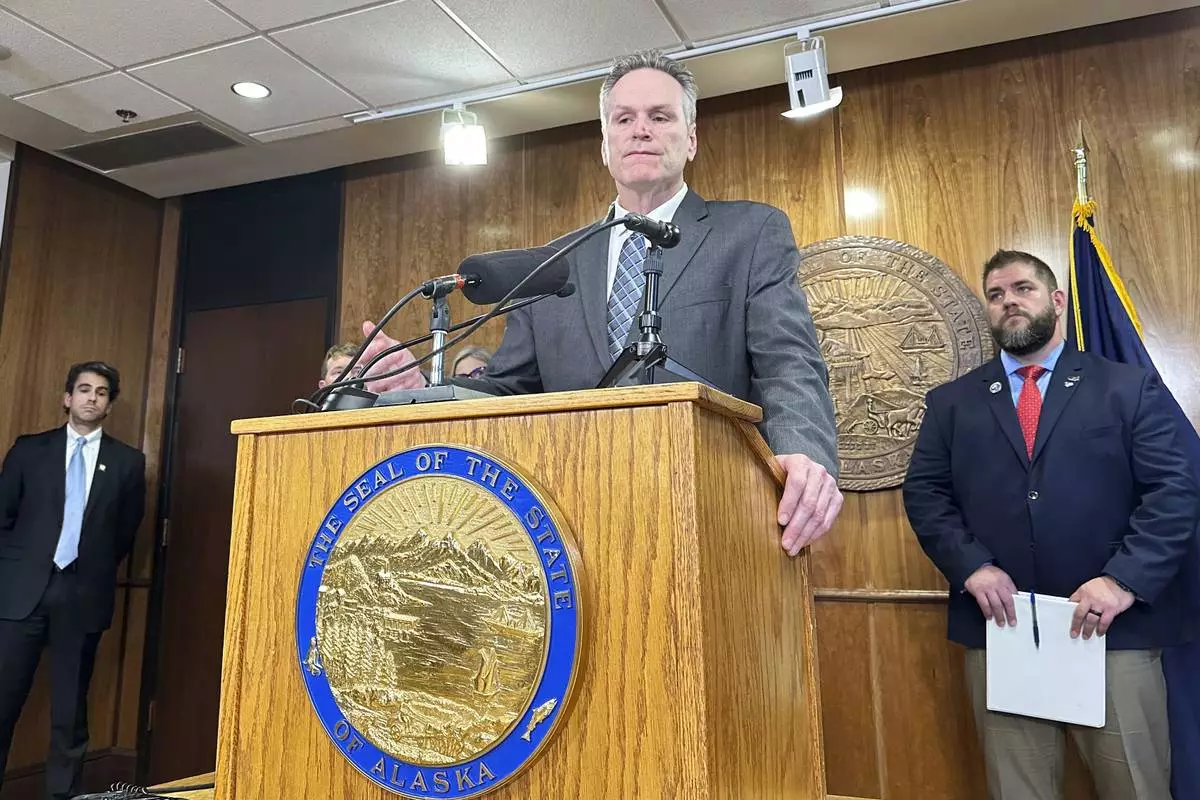
Alaska Gov. Mike Dunleavy gestures during a news conference on Thursday, Dec. 12, 2024, in Juneau, Alaska, in which he outlined his budget proposal for the coming year. (AP Photo/Becky Bohrer)
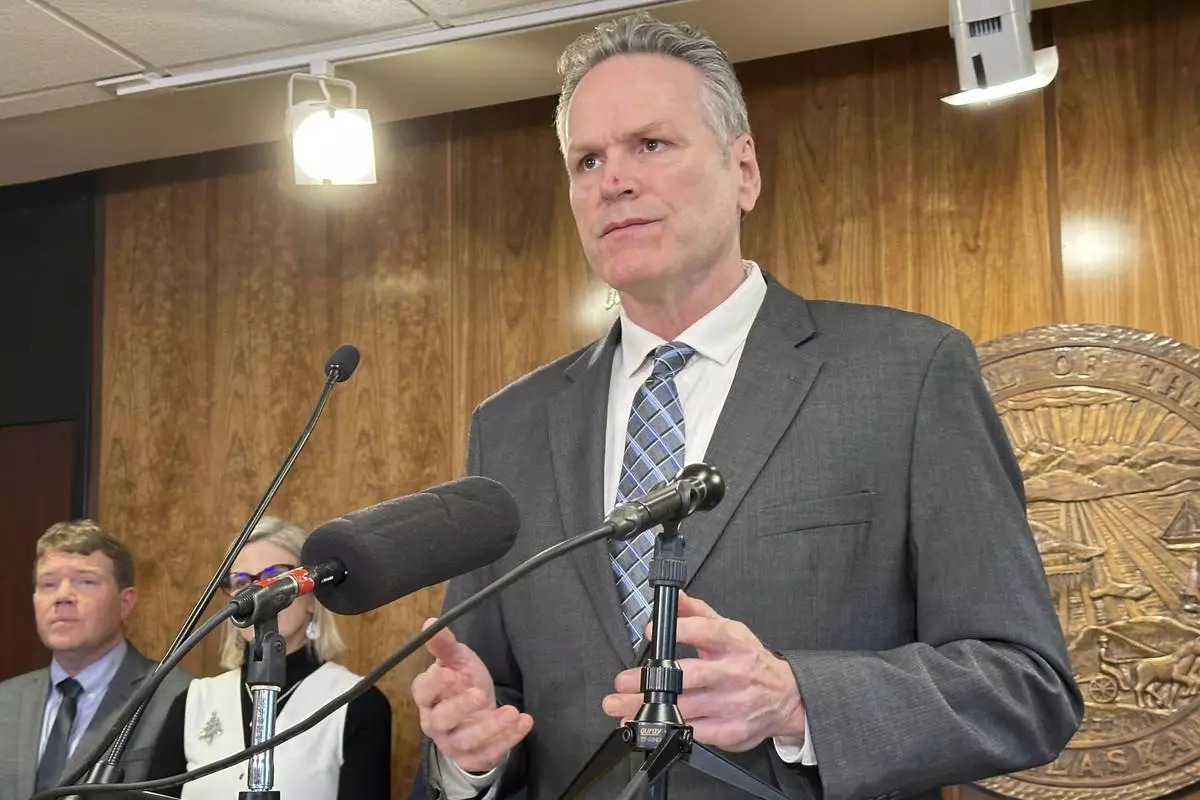
Alaska Gov. Mike Dunleavy holds during a news conference on Thursday, Dec. 12, 2024, in Juneau, Alaska, outlining his budget proposal for the coming year. (AP Photo/Becky Bohrer)
WASHINGTON (AP) — A day before a potential government shutdown, the House resoundingly rejected President-elect Donald Trump's new plan Thursday to fund operations and suspend the debt ceiling, as Democrats and dozens of Republicans refused to accommodate his sudden demands.
In a hastily convened evening vote punctuated by angry outbursts over the self-made crisis, the lawmakers failed to reach the two-thirds threshold needed for passage — but House Speaker Mike Johnson appeared determined to reassess, before Friday's midnight deadline.
“We're going to regroup and we will come up with another solution, so stay tuned,” Johnson said after the vote. The cobbled-together plan didn’t even get a majority, with the bill failing 174-235.
The outcome proved a massive setback for Trump and his billionaire ally, Elon Musk, who rampaged against Johnson's bipartisan compromise, which Republicans and Democrats had reached earlier to prevent a Christmastime government shutdown.
It provides a preview of the turbulence ahead when Trump returns to the White House with Republican control of the House and Senate. During his first term, Trump led Republicans into the longest government shutdown in history during the 2018 Christmas season, and interrupted the holidays in 2020 by tanking a bipartisan COVID-relief bill and forcing a do-over.
Hours earlier Thursday, Trump announced “SUCCESS in Washington!” in coming up with the new package which would keep government running for three more months, add $100.4 billion in disaster assistance including for hurricane-hit states, and allow more borrowing through Jan. 30, 2027.
"Speaker Mike Johnson and the House have come to a very good Deal,” Trump posted.
But Republicans, who had spent 24 hours largely negotiating with themselves to cut out the extras conservatives opposed and come up with the new plan, ran into a wall of resistance from Democrats, who were in no hurry to appease demands from Trump — or Musk.
House Democratic Leader Hakeem Jeffries said Democrats were sticking with the original deal with Johnson and called the new one “laughable.”
“It's not a serious proposal,” Jeffries said as he walked to Democrats' own closed-door caucus meeting. Inside, Democrats were chanting, “Hell, no!”
All day, Johnson had been fighting to figure out how to meet Trump's almost impossible demands — and keep his own job — while federal offices are being told to prepare to shutter operations.
The new proposal whittled the 1,500-page bill to 116 pages and dropped a number of add-ons — notably the first pay raise for lawmakers in more than a decade, which could have allowed as much as a 3.8% bump. That drew particular scorn as Musk turned his social media army against the bill.
Trump said early Thursday that Johnson will “easily remain speaker” for the next Congress if he “acts decisively and tough” in coming up with a new plan to also raise the debt limit, a stunning request just before the Christmas holidays that has put the beleaguered speaker in a bind.
And if not, the president-elect warned of trouble ahead for Johnson and Republicans in Congress.
“Anybody that supports a bill that doesn’t take care of the Democrat quicksand known as the debt ceiling should be primaried and disposed of as quickly as possible,” Trump told Fox News Digital.
The tumultuous turn of events, coming as lawmakers were preparing to head home for the holidays, sparks a familiar reminder of what it's like in Trump-run Washington.
For Johnson, who faces his own problems ahead of a Jan. 3 House vote to remain speaker, Trump's demands left him severely weakened, forced to abandon his word with Democrats and work into the night to broker the new approach.
Trump’s allies even floated the far-fetched idea of giving Musk the speaker’s gavel, since the speaker is not required to be a member of the Congress. Rep. Marjorie Taylor Greene, R-Ga., posted she was “open” to the idea.
Democrats were beside themselves, seeing this as a fitting coda after one of the most unproductive congressional sessions in modern times.
“Here we are once again in chaos,” said House Democratic Whip Katherine Clark, who detailed the harm a government shutdown would cause Americans. “And what for? Because Elon Musk, an unelected man, said, ‘We’re not doing this deal, and Donald Trump followed along.’”
As he left the Capitol, Senate Majority Leader Chuck Schumer said, "Now it’s time to go back to the bipartisan agreement.”
The debate in the House chamber grew heated as lawmakers blamed each other for the mess.
At one point, Rep. Marc Molinaro, who was presiding, slammed the speaker’s gavel with such force that it broke.
The stakes couldn't be higher. Trump was publicly turning on those who opposed him.
One hardline Republican, Rep. Chip Roy of Texas, drew Trump’s ire for refusing to along with the plan. Roy in turn told his own GOP colleagues they had no self-respect for piling onto the nation’s debt.
“It’s shameful!” Roy thundered, standing on the Democratic side of the aisle and pointing at his fellow Republicans.
The slimmed-down package does include federal funds to rebuild Baltimore’s collapsed Key Bridge, but dropped a separate land transfer that could have paved the way for a new Washington Commanders football stadium.
It abandons a long list of other bipartisan bills that had support as lawmakers in both parties try to wrap work for the year. It extends government funds through March 14.
Adding an increase in the debt ceiling to what had been a bipartisan package is a show-stopper for Republicans who want to slash government and routinely vote against more borrowing. Almost three dozen Republicans voted against it.
While Democrats have floated their own ideas in the past for lifting or even doing away with the debt limit caps — Sen. Elizabeth Warren had suggested as much — they appear to be in no bargaining mood to save Johnson from Trump — even before the president-elect is sworn into office.
The current debt limit expires Jan. 1, 2025, and Trump wants the problem off the table before he joins the White House.
Musk, in his new foray into politics, led the charge. The wealthiest man in the world used his social media platform X to amplify the unrest, and GOP lawmakers were besieged with phone calls to their offices telling them to oppose the plan.
Rep. Steve Womack, an Arkansas Republican and senior appropriator, said the bipartisan bill's collapse signaled what's ahead in the new year, “probably be a good trailer right now for the 119th Congress.”
The White House’s Office of Management and Budget had provided initial communication to agencies about possible shutdown planning last week, according to an official at the agency.
Associated Press writers Jill Colvin, Stephen Groves, Farnoush Amiri and Matt Brown contributed to this story.
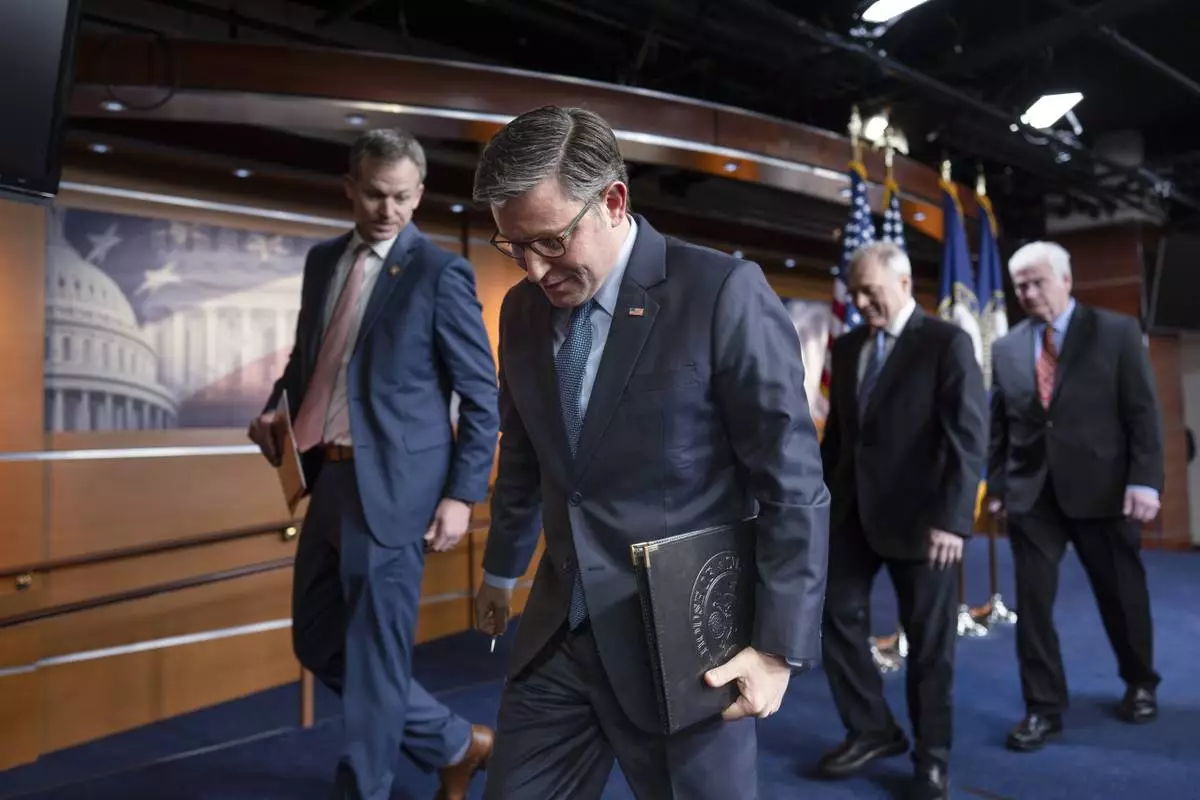
FILE—Speaker of the House Mike Johnson, R-La., joined from left by Rep. Blake Moore, R-Utah, House Majority Leader Steve Scalise, R-La., and Majority Whip Tom Emmer, R-Minn., leaves a news conference after presenting his final version of an interim pending bill to his caucus, at the Capitol in Washington, Tuesday, Dec. 17, 2024. President-elect Donald Trump has now abruptly rejected the bipartisan plan to prevent a Christmastime government shutdown. Instead, he's telling House Speaker Mike Johnson and Republicans to essentially renegotiate — days before a deadline when federal funding runs out. (AP Photo/J. Scott Applewhite, File)
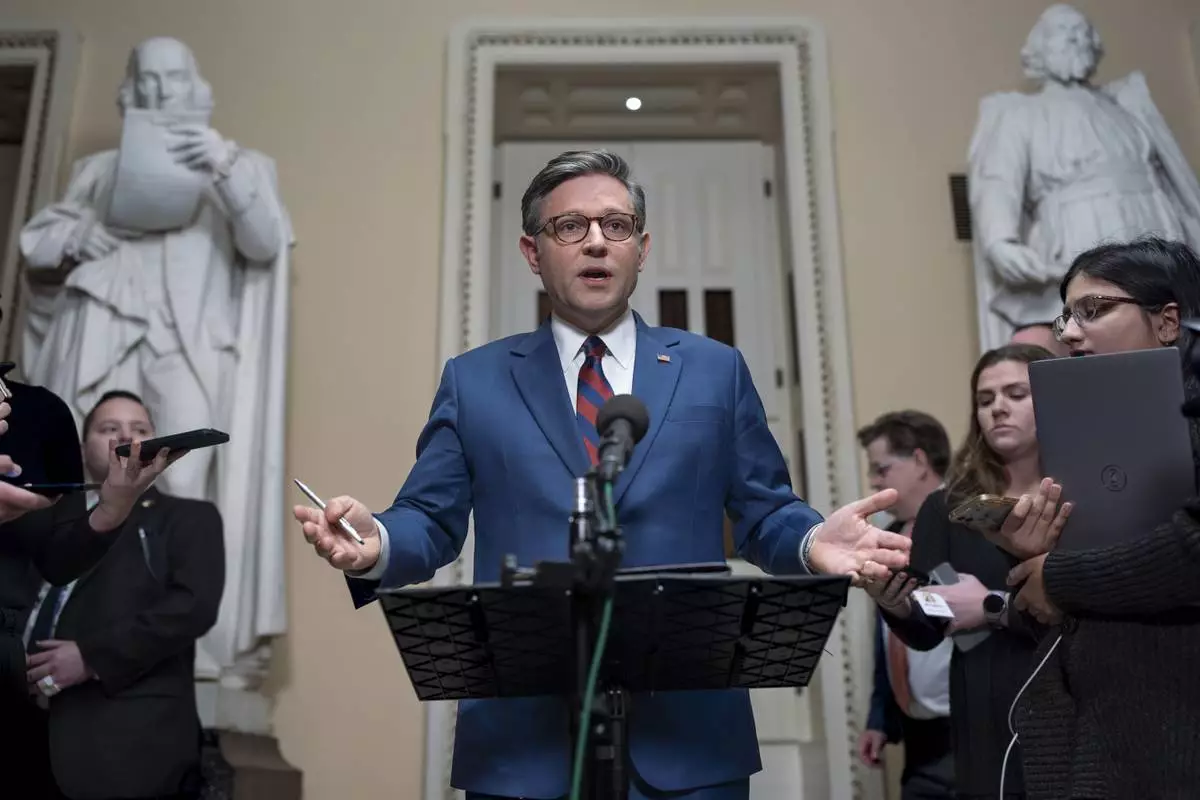
Speaker of the House Mike Johnson, R-La., talks briefly to reporters just before a vote on an amended interim spending bill to prevent a government shutdown, at the Capitol in Washington, Thursday, Dec. 19, 2024. (AP Photo/J. Scott Applewhite)

Speaker of the House Mike Johnson, R-La., talks briefly to reporters just before a vote on an interim spending bill to prevent a government shutdown, at the Capitol in Washington, Thursday, Dec. 19, 2024. The vote failed to pass. (AP Photo/J. Scott Applewhite)

FILE—Speaker of the House Mike Johnson, R-La., takes questions from reporters after presenting his final version of an interim pending bill to his caucus, at the Capitol in Washington, Tuesday, Dec. 17, 2024. President-elect Donald Trump has now abruptly rejected the bipartisan plan to prevent a Christmastime government shutdown. Instead, he's telling House Speaker Mike Johnson and Republicans to essentially renegotiate — days before a deadline when federal funding runs out. (AP Photo/J. Scott Applewhite, File)

FILE—Speaker of the House Mike Johnson, R-La., left, with Majority Leader Steve Scalise, R-La., meets with reporters after presenting his final version of an interim pending bill to his caucus, at the Capitol in Washington, Tuesday, Dec. 17, 2024. President-elect Donald Trump has now abruptly rejected the bipartisan plan to prevent a Christmastime government shutdown. Instead, he's telling House Speaker Mike Johnson and Republicans to essentially renegotiate — days before a deadline when federal funding runs out. (AP Photo/J. Scott Applewhite, File)
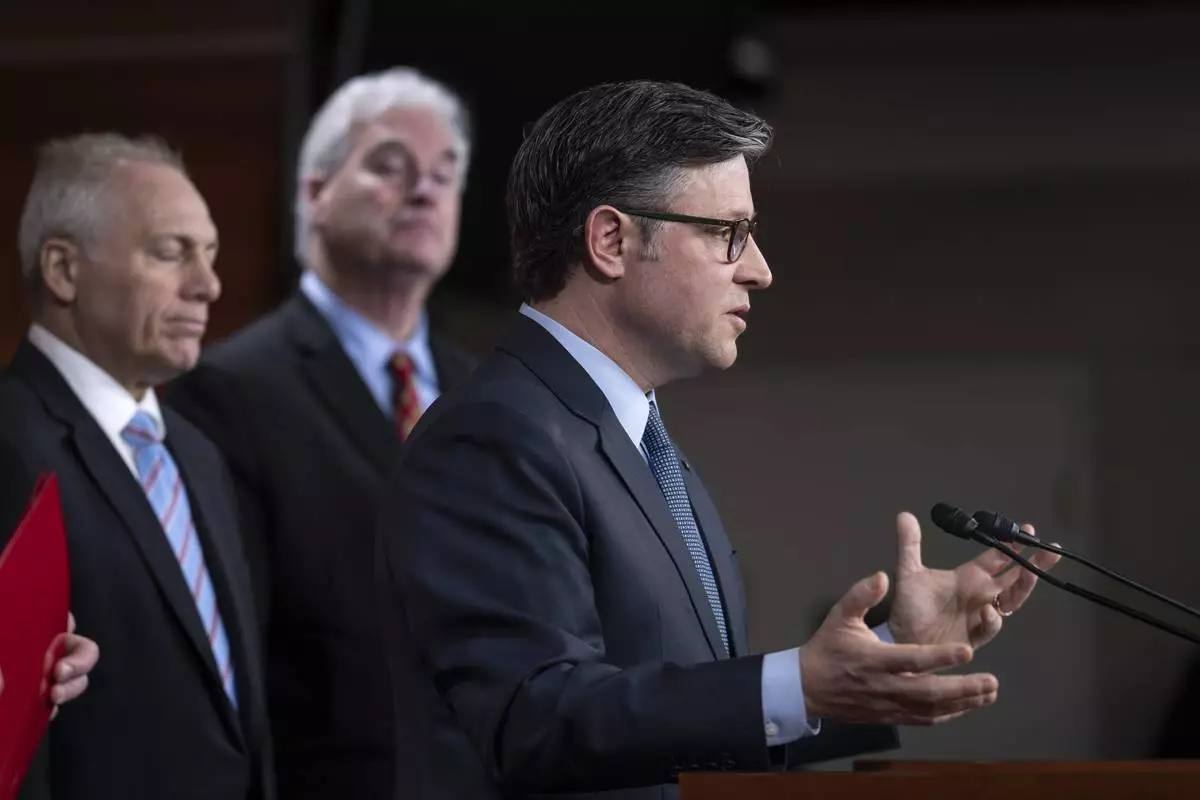
Speaker of the House Mike Johnson, R-La., center, joined from left by House Majority Leader Steve Scalise, R-La., and Majority Whip Tom Emmer, R-Minn., talks at a news conference after presenting his final version of an interim spending bill to his caucus, at the Capitol in Washington, Tuesday, Dec. 17, 2024. President-elect Donald Trump has now abruptly rejected the bipartisan plan to prevent a Christmastime government shutdown. Instead, he's telling House Speaker Mike Johnson and Republicans to essentially renegotiate — days before a deadline when federal funding runs out. (AP Photo/J. Scott Applewhite, File)




